
The men's sprint at the 2004 Summer Olympics (Cycling) was an event that consisted of cyclists making three laps around the track. Only the time for the last 200 metres of the 750 metres covered was counted as official time. There were 19 competitors from 13 nations, with each nation limited to two cyclists. The event was won by Ryan Bayley of Australia, the nation's first victory in the men's sprint after three times coming in second. Theo Bos of the Netherlands took silver, the Dutch team's first medal in the event since 1936. René Wolff earned bronze, stretching Germany's podium streak to four Games.
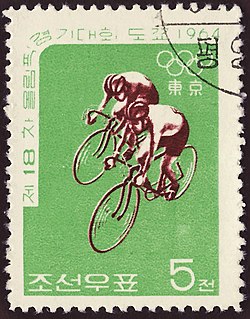
The men's sprint was a track cycling event held as part of the Cycling at the 1964 Summer Olympics programme. It was held on 17 and 18 October 1964 at the Hachioji Velodrome. 39 cyclists from 22 nations competed. Nations were limited to two cyclists each. The event was won by Giovanni Pettenella of Italy, the nation's second consecutive and fourth overall victory in the men's sprint. Sergio Bianchetto took silver, making it the second consecutive Games in which Italy had two men on the podium in the event. It was also the fifth straight Games with Italy taking at least silver. Daniel Morelon of France took bronze, the first of his record four medals in the event.
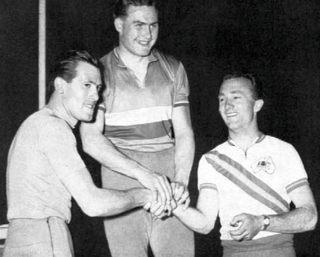
The men's sprint or "scratch race" at the 1956 Summer Olympics in Melbourne, Australia, was held from 3 to 6 December 1956. There were 18 participants representing 18 nations in competition, with one additional non-starter. Each nation was limited to one cyclist. The event was won by Michel Rousseau of France, the nation's first victory in the men's sprint since 1928 and fifth overall. Guglielmo Pesenti of Italy earned silver and Dick Ploog of Australia finished third for bronze.

The men's sprint at the 1952 Summer Olympics in Helsinki, Finland was held from July 28 to July 31, 1952. There were 27 participants from 27 nations, with each nation limited to a single cyclist. The event was won by Enzo Sacchi of Italy, the nation's second consecutive victory in the men's sprint. Lionel Cox's silver was Australia's first medal in the event. Werner Potzernheim of Germany took bronze.
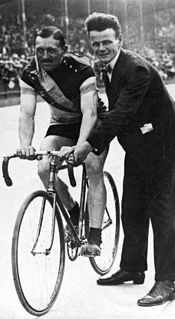
The men's sprint event was part of the track cycling programme at the 1920 Summer Olympics. There were 37 competitors from 11 nations, with each nation apparently limited to four cyclists. The event was won by Maurice Peeters of the Netherlands, the nation's first victory in the men's sprint. Two British cyclists, Thomas Johnson and Harry Ryan, were in the final as well, taking silver and bronze.
The women's sprint at the 2008 Summer Olympics took place on August 19 at the Laoshan Velodrome.

The men's sprint event was part of the track cycling programme at the 1924 Summer Olympics. The field consisted of 31 cyclists from 17 countries. The Vélodrome de Vincennes track was a 500-metre (1,640 ft) loop. The event was won by Lucien Michard of France, the nation's third victory in the men's sprint. His teammate Jean Cugnot earned bronze. Jacob Meijer of the Netherlands took silver, putting the Dutch team on the podium for the second consecutive Games.

The men's sprint cycling event at the 1932 Summer Olympics took place on August 1 and 3. The format was a sprint of 1000 metres. There were nine competitors from nine nations, with each nation limited to one cyclist. The event was won by Jacobus van Egmond of the Netherlands, the nation's second victory in the men's sprint. It was the fourth consecutive Games that the Netherlands reached the podium in the event. France made the podium for the third consecutive Games, with Louis Chaillot taking silver. Bruno Pellizzari gave Italy its first men's sprint medal with his bronze.

The men's sprint at the 2000 Summer Olympics (Cycling) was an event that consisted of cyclists making three laps around the track. Only the time for the last 200 metres of the 750 metres covered was counted as official time. The races were held on Monday, 18 September, Tuesday, 19 September, and Wednesday, 20 September 2000 at the Dunc Gray Velodrome. There were 19 competitors from 14 nations, with each nation limited to two cyclists. The event was won by Marty Nothstein of the United States, the nation's first victory in the men's sprint since 1984 and second overall. Nothstein was the seventh man to win multiple medals in the event. The silver medal went to Florian Rousseau, France's first medal in the event since 1980. Two-time defending champion Jens Fiedler of Germany lost to Nothstein in the semifinals, but won the bronze medal match to become the second man to win three medals in the event.
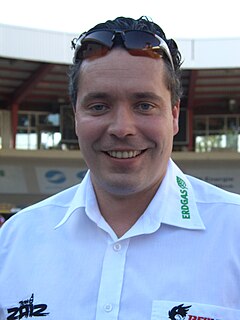
The men's sprint at the 1992 Summer Olympics (Cycling) was an event that consisted of cyclists making three laps around the track. Only the time for the last 200 metres of the 750 metres covered was counted as official time. The races were held on Tuesday, July 28, Wednesday, July 29, Thursday, July 30 and Friday, July 31, 1992, at the Velòdrom d'Horta. There were 23 competitors from 23 nations, with each nation limited to one cyclist. The event was won by Jens Fiedler of Germany, the first victory in the men's sprint for Germany as a unified nation since 1936. Gary Neiwand of Australia took silver, the third time that nation had a runner-up in the event; Neiwand was only the fourth man to win multiple medals in the sprint. Canada earned its first medal in the men's sprint with Curt Harnett's bronze.

The men's cycling sprint at the 2012 Olympic Games in London took place at the London Velopark from 4 to 6 August. There were 17 competitors from 17 nations, with nations once again limited to one cyclist each. The event was won by Jason Kenny of Great Britain, the nation's second consecutive victory in the men's sprint. Kenny was the eighth man to win multiple medals in the event. Kenny beat Grégory Baugé of France in the final. Australia's Shane Perkins took bronze.

The men's sprint at the 1928 Summer Olympics took place at the Olympic Stadium in Amsterdam. There were 18 competitors from 18 nations, with each nation limited to one cyclist. The event was won by Roger Beaufrand of France, the nation's second consecutive and fourth overall victory in the men's sprint. Antoine Mazairac of the Netherlands, the only other nation to have won a gold medal in the event, put the Dutch team on the podium for the third consecutive Games with his silver. Willy Hansen earned Denmark's first medal in the event, with his bronze.

The men's sprint at the 1996 Summer Olympics (Cycling) was an event that consisted of cyclists making three laps around the track. Only the time for the last 200 metres of the 750 metres covered was counted as official time. The races were held on July 24 through July 28, 1996 at the Stone Mountain Velodrome. There were 24 competitors from 16 nations, with nations once again being allowed to have up to two cyclists each. The event was won by Jens Fiedler of Germany, the second man to successfully defend an Olympic sprint title. Curt Harnett of Canada also repeated as bronze medalist; he and Fiedler were the fifth and sixth men to win multiple medals of any color in the event. Marty Nothstein of the United States took silver, the nation's first medal in the event since 1984.
The women's 200m Sprint at the 1996 Summer Olympics Cycling was an event that consisted of cyclists making three laps around the track. Only the time for the last 200 meters of the 750 meters covered was counted as official time. The races were held on Wednesday, July 24, Thursday, July 25, Friday, July 26, and Saturday, July 27, 1996 at the Stone Mountain Velodrome.

The men's sprint cycling event at the 1936 Summer Olympics took place on 6 and 7 August and was one of six events at the 1936 Olympics. There were 20 competitors from 20 nations, with each nation limited to one cyclist. The event was won, in a disputed final, by Toni Merkens of Germany, the nation's first medal in the men's sprint. Arie van Vliet took the silver medal, the fifth consecutive Games that a Dutch cyclist had finished in the top two. Louis Chaillot of France became the first man to win multiple medals in the event, adding a bronze to his 1932 silver; it was the fourth consecutive podium appearance for France.
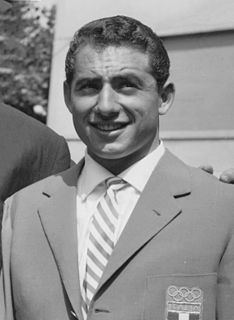
The men's sprint at the 1960 Summer Olympics in Rome, Italy was held on 26 to 29 August 1960. There were 30 participants from 18 nations. For the first time since 1924, nations were allowed to have more than one competitor each ; for the first time since 1924, one nation took multiple medals. Italians Sante Gaiardoni and Valentino Gasparella won gold and bronze, giving Italy a four-Games podium streak with three total gold medals—second all-time behind France's five. Leo Sterckx's silver was Belgium's first medal in the men's sprint.
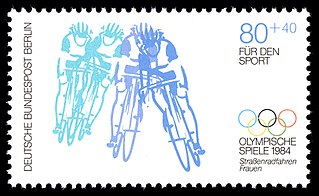
The men's sprint cycling event at the 1984 Summer Olympics took place from 31 July to 3 August and was one of eight cycling events at the 1984 Olympics. Once again, the limit on cyclists per nation was raised to 2. The event was won by Mark Gorski of the United States, the nation's first victory in the men's sprint and first medal in the event since John Henry Lake took bronze in 1900. The final was all-American, as Nelson Vails took silver. Japan earned its first medal in the men's sprint with Tsutomu Sakamoto's bronze. France's five-Games podium streak in the event ended.

The men's sprint cycling event at the 1988 Summer Olympics took place from 21 to 24 September and was one of the nine cycling events at the 1988 Olympics. There were 25 competitors from 25 nations. After the 1984 Games had featured a humongously bloated 34-cyclist, 11-round, 63-match competition, the competition size was cut down by restricting nations to one cyclist yet again and instituting a qualifying round: this reduced the format to 25 cyclists, 8 rounds, and 29 matches. The event was won by Lutz Heßlich of East Germany, the 1980 gold medalist who was unable to compete in 1984 due to the Soviet-led boycott. Soviet cyclist Nikolai Kovsh took silver, the best result to date for the Soviets. Gary Neiwand of Australia earned bronze; for both the Soviets and Australians, it was the first medal in the event since 1972.

The men's sprint event at the 2020 Summer Olympics took place from 4 to 6 August 2021 at the Izu Velodrome. 30 cyclists from 18 nations competed.

The women's sprint event at the 2020 Summer Olympics took place from 6 to 8 August 2021 at the Izu Velodrome. 30 cyclists from 18 nations competed. Canadian rider Kelsey Mitchell won gold, with Olena Starikova from Ukraine and Lee Wai-sze from Hong-Kong completing the medal positions.















